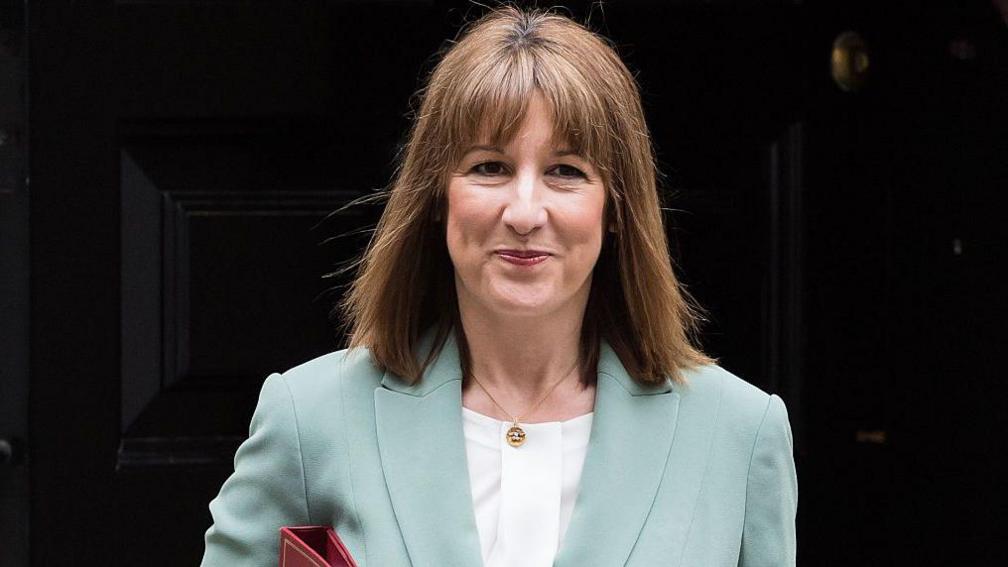Which benefits are going up and by how much?

- Published
The cost of living is always important to our finances, but this month what is happening to prices will have a particular extra impact for millions of people.
The September inflation figure reflects what has been happening to prices over the past year, and will affect how far your money goes and how much benefits will go up next year as well as influencing the Bank of England's interest rate decisions.
It also comes just over a month before the Budget, with the chancellor confirming she has been looking at further measures on tax and spending.
Here are some of the ways in which the latest inflation figure will directly affect you and your money.
Universal credit and other benefits
Typically, September's Consumer Prices Index (CPI) measure of inflation, which this time is 3.8%, is the benchmark for raising benefits the following April.
Some benefits, including all the main disability benefits, such as personal independence payment, attendance allowance and disability living allowance, as well as carer’s allowance, will rise by at least as much as prices have been rising.
Universal credit (UC) - which is the most common benefit, claimed by seven and a half million people - will rise by more than inflation.
The government's legislation earlier this year, designed to restore the value of support for households on low incomes but shift its focus away from health-related benefits, means the UC standard allowance will rise by 6.2%.
That would mean the standard UC allowance would rise from £92 to £98 per week for single claimants, and from £145 to £154 per week for couples, the Joseph Rowntree Foundation calculates.
However, the health-related element of UC will not rise in line with inflation.
Bigger increase for the state pension
The state pension rise is set using different criteria: what is known as the triple lock.
Under that arrangement, the state pension goes up each year by either 2.5%, or by inflation, or by earnings growth - whichever is the highest figure.
This time around, we now know, that average earnings growth is the highest of these, at 4.8%.
This means:
The full, new flat-rate state pension (for those who reached state pension age after April 2016) is expected to increase from its current £230.30 a week to £241.30 a week. That will take it to £12,547 a year.
The full, old basic state pension (for those who reached state pension age before April 2016) is expected to go up from £176.45 a week to £184.90. That will take it to £9,615 a year.
Not all pensioners receive the full state pension, and some rely on other benefit income.
Wages and prices
Stubbornly rising prices in the UK over the past year mean that everyone's incomes are stretched further.
Rising wages can help counter that, putting more money in peoples' pockets so that even if prices are higher, their spending power doesn't fall.
However, the poverty-focused think tank the Resolution Foundation says real pay growth, once inflation has been taken into account, has been weakening. It calculates that weekly wages have grown "by no more than the price of a Gregg's sausage roll", or £1.50, over the past 11 months.
Workers on the government-set minimum wage have fared better following inflation-busting rises in April.
Interest and mortgage rate cuts more likely

Inflation remains well above the Bank of England's 2% target. But September's 3.8% figure was lower than the 4% the Bank of England and other economists had forecast.
So speculation is growing that another interest rate cut could be on the cards.
Usually the Bank of England keeps interest rates higher if inflation is causing concern, to discourage borrowing and spending that can make the problem worse.
If inflation seems to be easing, there could be a rate cut as soon as November or December, some economists suggest, which would make it cheaper to borrow, including for mortgages.
An easing of mortgage costs would be welcomed not only by homeowners but also by renters. Lower costs for landlords might help put a stop to persistent rises in rents.
On the other hand, lower Bank of England interest rates can mean lower rates for savers, too.
Implications for the Budget
All eyes are now on the chancellor who is busy finalising her Budget set for 26 November.
Rachel Reeves said she wasn't satisfied with a slightly smaller than expected rise in prices in September and planned to take action to bring inflation down further. There have been hints that might come through lower household energy bills.
But the prospect of easing inflation could also throw her a lifeline as she battles to make the numbers add up without breaking manifesto promises on borrowing and taxation.
It will mean welfare spending, and other government costs, are lower than they might have been. And borrowing costs for the government itself are already edging downwards, all of which would give her more room for manoeuvre.
- Published4 days ago

- Published22 October

